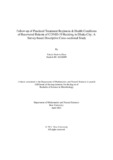| dc.contributor.advisor | Haque, Fahim Kabir Monjurul | |
| dc.contributor.author | Khan, Tahsin Shahrin | |
| dc.date.accessioned | 2021-09-15T17:33:52Z | |
| dc.date.available | 2021-09-15T17:33:52Z | |
| dc.date.copyright | 2021 | |
| dc.date.issued | 2021-04 | |
| dc.identifier.other | ID: 16226009 | |
| dc.identifier.uri | http://hdl.handle.net/10361/15020 | |
| dc.description | This thesis is submitted in partial fulfilment of the requirements for the degree of Bachelor of Science in Microbiology, 2021. | en_US |
| dc.description | Catalogued from PDF version of thesis. | |
| dc.description | Includes bibliographical references (pages 30-33). | |
| dc.description.abstract | Background and aim: Coronavirus disease 2019 (COVID-19), has spread worldwide like
wildfire since late December 2019. Caused by severe acute respiratory syndrome coronavirus2 (SARS-CoV-2), this pandemic has induced a sense of panic and caused hundreds of
thousands of deaths globally in short span of time. Bangladesh is not an exception regarding
COVID-19; there have been several thousand COVID-19 cases and several hundreds of deaths
reported so far. This survey-based descriptive cross-sectional study aims to study the prognosis
of this viral infection, mainly focusing on the experienced symptoms, treatment regimens and
post-recovery health conditions of the patients affected with COVID-19 residing in Dhaka city.
Materials and methods: All the respondents of this study were diagnosed at IEDCR from
October to December 2020, and they resided in Dhaka city corporation area. The data were
collected via an online survey using Google forms and were analyzed using SPSS version
26.00. The privacy of the respondents and confidentiality of the data were strictly maintained
as per protocol.
Results: Among the 522 respondents mean age was 39.76±13.02 years. The respondents
consisted of 70.31% males and 29.50% females. The mean BMI of the respondents was
26.4±6.52 kg/m2
. Among the respondents 39.3% were found to have various underlying health
conditions. About 88.5% of the respondents suffered from a diverse range of symptoms
including fever, fatigue, reduced sense of smell and taste, body pain, headache, dry cough etc.
The respondents were on various medications that fell under the national guideline for COVID19 management of Bangladesh. A mean of 19.71±7.56 days was required by the respondents
to obtain a negative RT-PCR result. Various symptoms like fatigue, anxiety and/or depression,
uneasiness, body pain, headache, dry cough etc. persisted in 76.3% of the respondents even
after their recovery.
Conclusion: Males were more likely to be get affected by COVID-19 than females. Common
symptoms of COVID-19 included fever, fatigue, headache, dry cough; less common
symptoms like a reduced sense of smell and taste were also prevalent. Most respondents tend
to take a longer time to get symptom-free than obtain a negative result. Further studies are
required to provide more COVID-19 related information of Bangladesh. | en_US |
| dc.description.statementofresponsibility | Tahsin Shahrin Khan | |
| dc.format.extent | 33 Pages | |
| dc.language.iso | en_US | en_US |
| dc.publisher | Brac University | en_US |
| dc.rights | Brac University theses are protected by copyright. They may be viewed from this source for any purpose, but reproduction or distribution in any format is prohibited without written permission. | |
| dc.subject | COVID-19 | en_US |
| dc.subject | SARS-CoV-2 | en_US |
| dc.subject | Bangladesh | en_US |
| dc.subject | Dhaka | en_US |
| dc.subject | Survey | en_US |
| dc.subject | Symptoms | en_US |
| dc.subject | Treatment regimens | en_US |
| dc.title | Follow-Up of practiced treatment regimens & health conditions of recovered patients of COVID-19 residing in Dhaka city: A survey-based descriptive cross-sectional study | en_US |
| dc.type | Thesis | en_US |
| dc.contributor.department | Department of Mathematics and Natural Sciences, Brac University | |
| dc.description.degree | B. Microbiology | |

